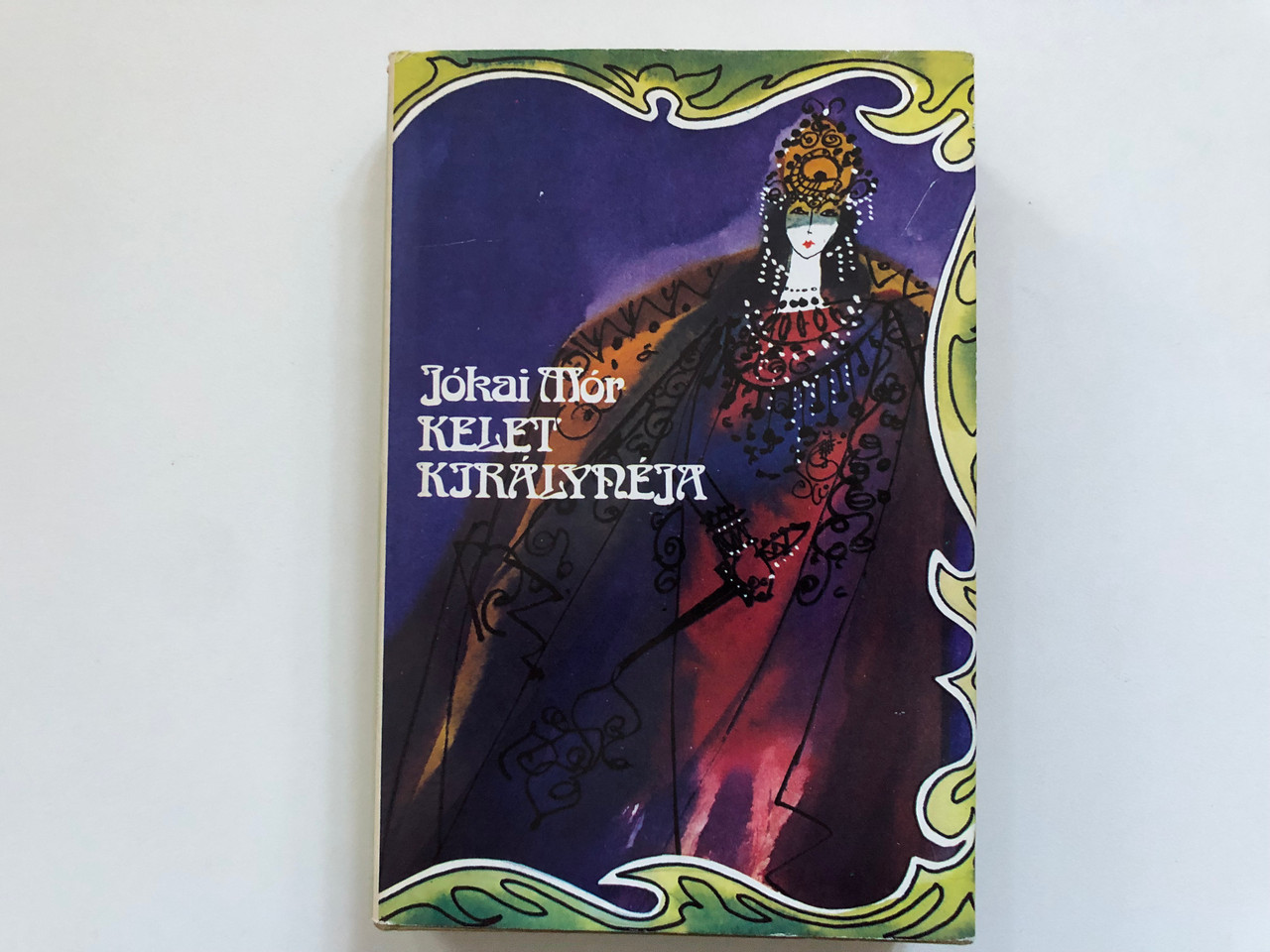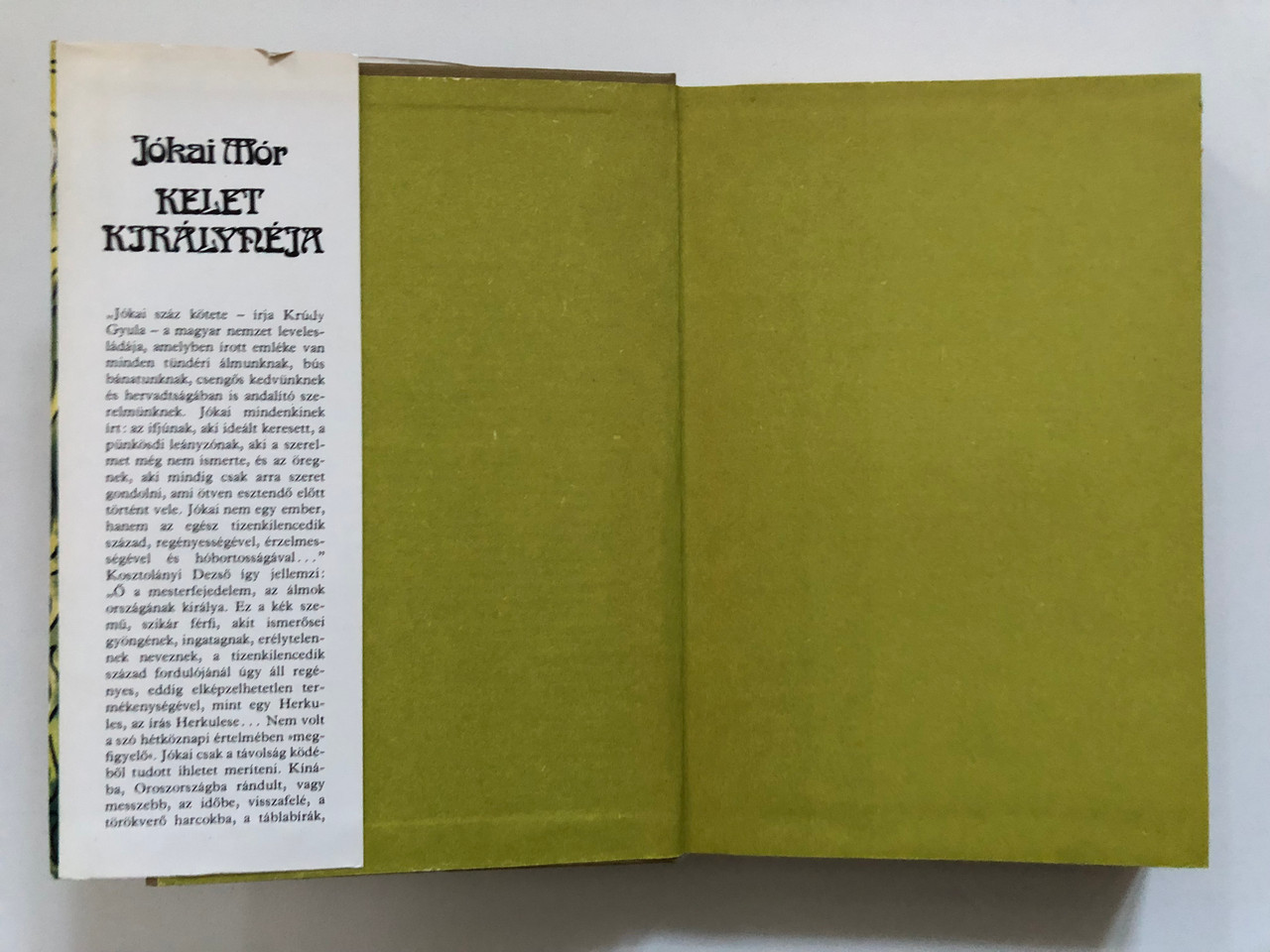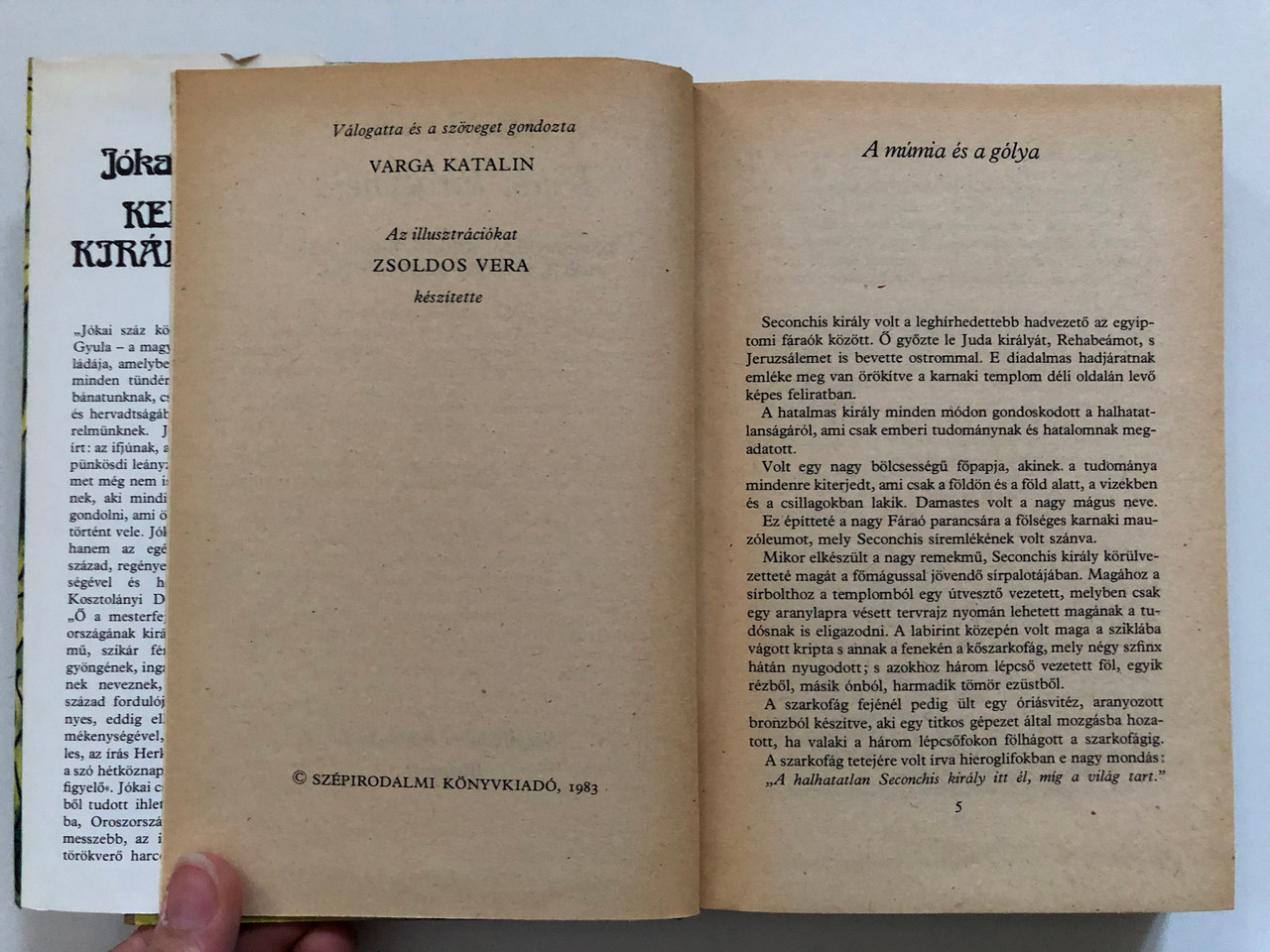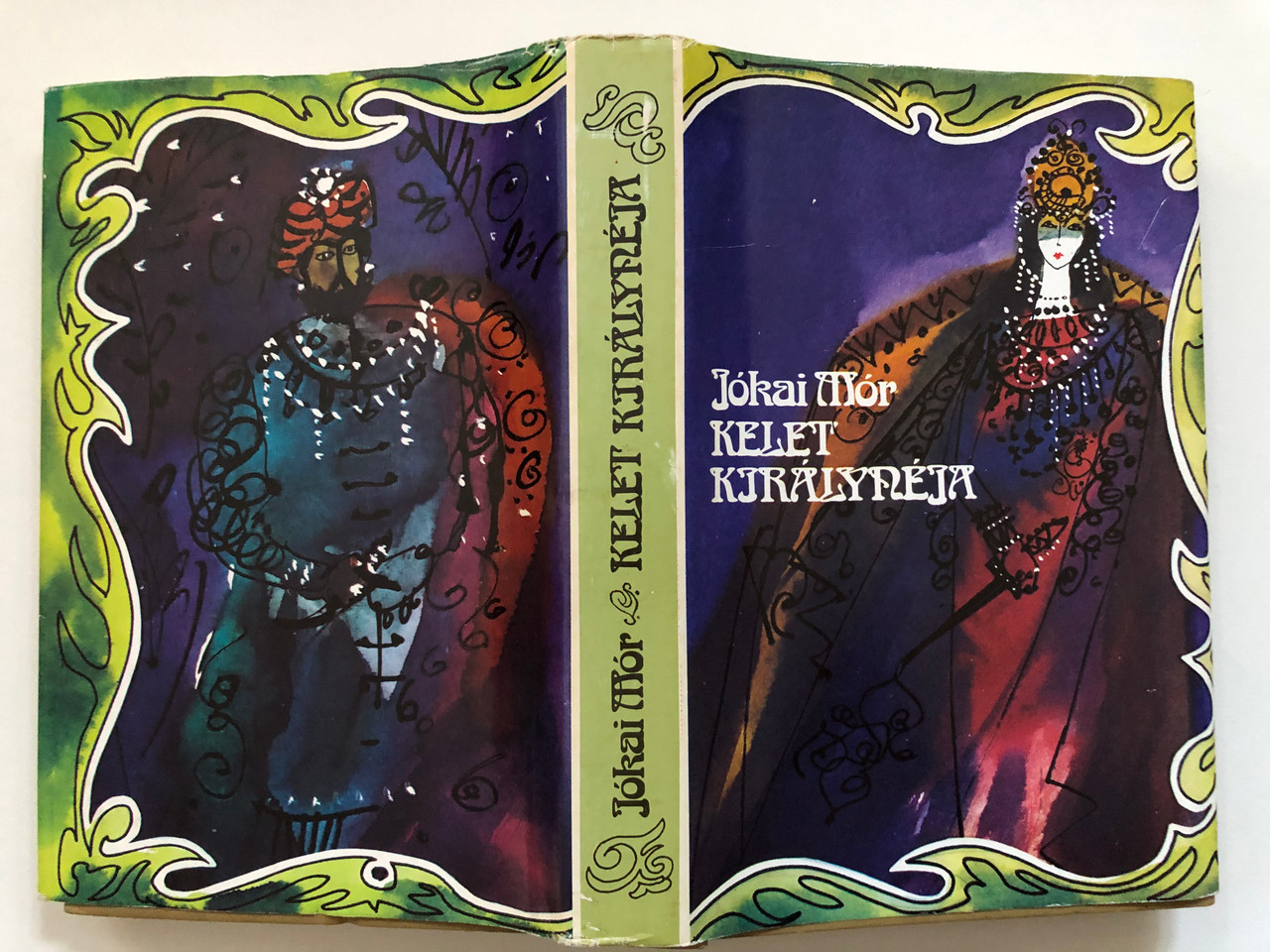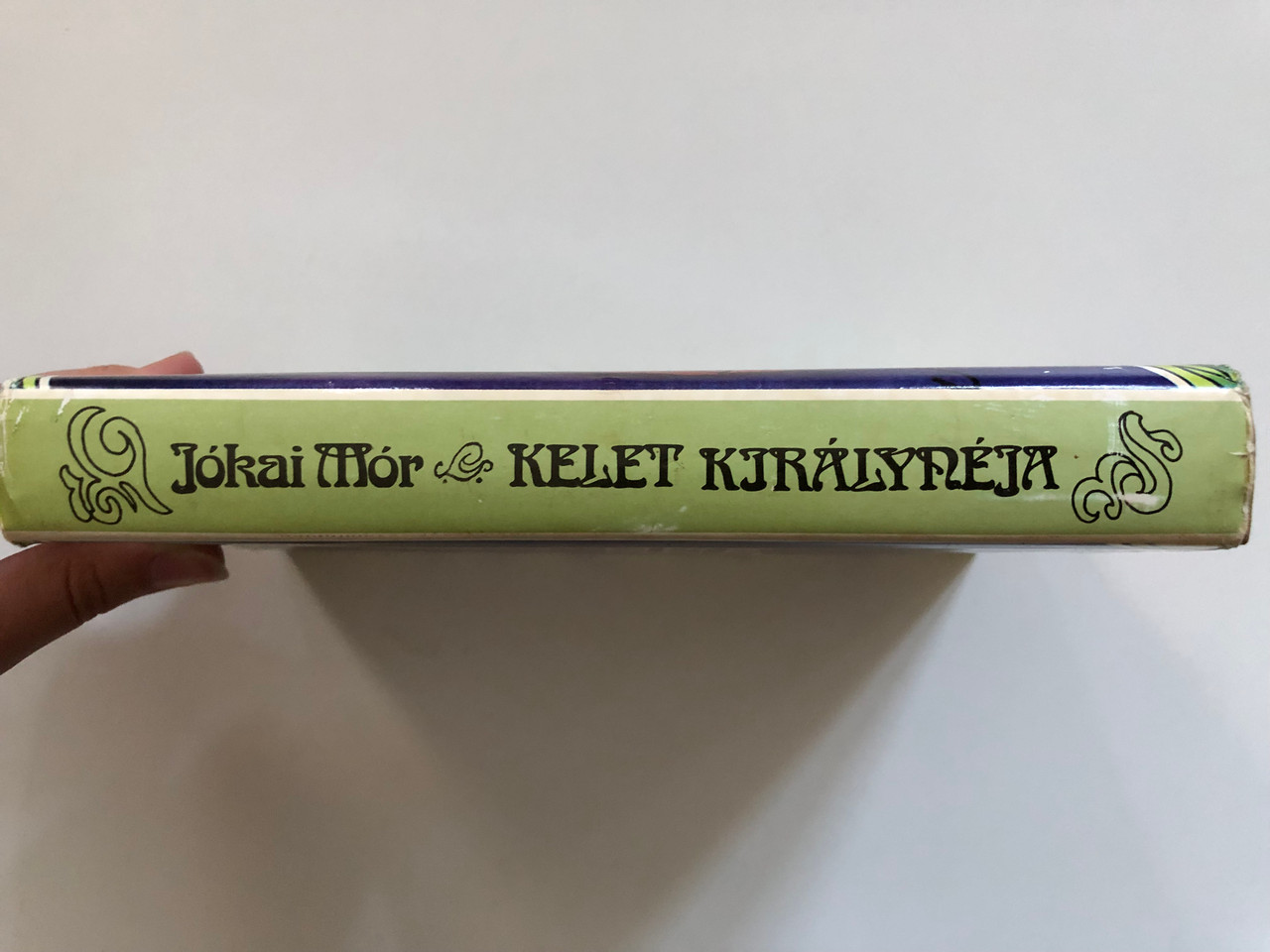Description
Kelet Királynéja (Queen of the East) | Historical Short Stories Collection by Jókai Mór
Product Information
- ISBN: 9631524078
- Product Code: Sz 3797-d-8384
- Product Type: Literary Collection/Short Stories
- Genre: Historical Fiction/Hungarian Literature
- Language: Hungarian
- Format: Hardcover
- Page Count: Approximately 34.17 A/5 sheets + 6 pages of supplements
- Publication Date: 1983
- Publisher: Szépirodalmi Könyvkiadó, Budapest
- Target Audience: Adult readers, literature enthusiasts
Overview
"Kelet Királynéja" (Queen of the East) is an exquisite collection of historical tales, stories, and curious anecdotes by the legendary Hungarian writer Mór Jókai. This carefully curated anthology draws from several of Jókai's original collections including Dekameron, Délvirágok (Southern Flowers), Mesék és regék (Tales and Legends), and others. The stories are arranged not by their date of creation but rather in historical chronological order based on their content, offering readers a journey through different eras as imagined by one of Hungary's most beloved literary masters. This volume represents the rich storytelling tradition and romantic historical vision that made Jókai a national treasure.
Hungarian Translation - Overview (Áttekintés)
A "Kelet Királynéja" Jókai Mór legendás magyar író történelmi elbeszéléseinek, novelláinak és különös anekdotáinak gyűjteménye. Ez a gondosan válogatott antológia Jókai számos eredeti gyűjteményéből merít, beleértve a Dekameront, a Délvirágokat, a Mesék és regéket és másokat. A történetek nem keletkezésük időrendjében, hanem a tartalmuk szerinti történelmi kronológia alapján vannak elrendezve, így az olvasók utazást tehetnek különböző korokon át, ahogy azokat Magyarország egyik legszeretettebb irodalmi mestere elképzelte. Ez a kötet hűen tükrözi azt a gazdag elbeszélői hagyományt és romantikus történelmi látásmódot, amely Jókait nemzeti kinccsé tette.
Product Features
- Content: Historical tales and stories from various Jókai collections
- Organization: Stories arranged in historical chronological order
- Writing Style: Romantic, descriptive prose with rich historical details
- Language Notes: Original Jókai-era proper name spelling preserved
- Source Material: Compiled from multiple Jókai collections published in the National Edition (1894-98)
- Editorial Approach: Modern spelling used for common words, with exceptions for Roman-themed stories to preserve Latin authenticity
- Illustrations: Includes 6 pages of supplemental material
Interesting Facts
Literary Legacy of Jókai
As noted in the included quote by renowned Hungarian writer Dezső Kosztolányi, Jókai's collected works represent "the treasure chest of the Hungarian nation," containing literary reflections of national dreams, sorrows, joys, and romantic stories. Kosztolányi praised Jókai as not merely a writer but as the embodiment of the entire 19th century with its romanticism, sentimentality, and chivalry. Jókai wrote for everyone - the youth seeking ideals, young women not yet acquainted with love, and the elderly who preferred to reminisce about events from fifty years past.
The Master of Hungarian Romantic Prose
Kosztolányi described Jókai as "the master-prince, the king of the land of dreams." Despite being characterized by acquaintances as fragile, unstable, and lacking energy, this blue-eyed, slender man stood at the turn of the 19th century with an unprecedented literary productivity comparable to "Hercules, the Hercules of writing." Unlike typical writers, Jókai wasn't a direct observer of daily life but rather drew inspiration from distant realms - whether geographic (like China or Russia) or temporal, often retreating into historical periods like the Ottoman wars or the era of the táblabírák (district judges).
Editorial Philosophy of this Collection
The collection maintains an interesting balance between historical accuracy and readability. While the editors preserved Jókai's original spelling of proper names (including his inconsistencies), they modernized common words for contemporary readers. However, in stories with Roman themes, they kept original Latin forms to maintain the authentic atmosphere of the narratives. This editorial approach demonstrates the respect for Jókai's original style while making the text accessible to modern Hungarian readers.
Hungarian Translation - Interesting Facts (Érdekes Tények)
Jókai irodalmi öröksége
Ahogy a kötetben szereplő, Kosztolányi Dezső neves magyar író által jegyzett idézet említi, Jókai összegyűjtött művei "a magyar nemzet levelesládáját" jelentik, amely tartalmazza a nemzeti álmok, bánatok, örömök és romantikus történetek irodalmi tükröződéseit. Kosztolányi Jókait nem egyszerűen íróként, hanem a 19. század teljes megtestesítőjeként méltatta, annak romantikájával, érzelgősségével és lovagiasságával együtt. Jókai mindenkinek írt - az ideálokat kereső fiataloknak, a szerelmet még nem ismerő fiatal lányoknak, és az időseknek, akik szívesebben emlékeztek vissza az ötven évvel korábbi eseményekre.
A magyar romantikus próza mestere
Kosztolányi Jókait "a mesterfejedelemnek, az álmok országának királyaként" jellemezte. Bár ismerősei gyengének, bizonytalannak és erélytelen embernek tartották, ez a kék szemű, szikár férfi a 19. század fordulóján páratlan irodalmi termékenységével úgy állt, mint "Herkules, az írás Herkulese". A hétköznapi íróktól eltérően Jókai nem volt közvetlen megfigyelő, hanem távoli birodalmakból merített ihletet - akár földrajzi értelemben (mint Kína vagy Oroszország), akár időben visszafelé tekintve, gyakran a török háborúk korába vagy a táblabírák korszakába visszavonulva.
E gyűjtemény szerkesztői filozófiája
A gyűjtemény érdekes egyensúlyt tart a történelmi pontosság és az olvashatóság között. Míg a szerkesztők megőrizték Jókai eredeti helyesírását a tulajdonnevekben (beleértve következetlenségeit is), a közszavakat modernizálták a kortárs olvasók számára. Azonban a római témájú történetekben megtartották az eredeti latin formákat, hogy megőrizzék az elbeszélések hiteles hangulatát. Ez a szerkesztői megközelítés jól mutatja a Jókai eredeti stílusa iránti tiszteletet, miközben a szöveget hozzáférhetővé teszi a modern magyar olvasók számára.
Publishers
Published by Szépirodalmi Könyvkiadó, Budapest in 1983. Managing director: Endre Illés. Printed at Dabasi Nyomda in 1983 (work number: 82-1620), under the direction of Csaba Bálint. Typeset by Nyomdaipari Fényszedő Üzem (82.9132/08). Editor-in-charge: Pál Réz. Technical manager: László Ginács. Technical editor: Mrs. János Kiss.
We value your feedback! Share your experience with this product to help others make informed decisions. Your review is important to us!
Hashtags
English:
#JókaiMór #HungarianLiterature #HistoricalFiction #KeletKiralyneja #ClassicLiterature #19thCenturyLiterature #ShortStories #HungarianHistory #RomanticProse
Hungarian (Címkék):
#JókaiMór #MagyarIrodalom #TörténelmiElbeszélések #KeletKirálynéja #KlasszikusIrodalom #19SzázadiIrodalom #Novellák #MagyarTörténelem #RomantikusPróza





































